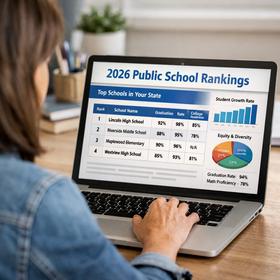Serving 490 students in grades Prekindergarten-1, Cedar Elementary School ranks in the top 50% of all schools in Massachusetts for overall test scores (math proficiency is top 50%, and reading proficiency is top 50%).
The percentage of students achieving proficiency in math is 55-59% (which is higher than the Massachusetts state average of 51%). The percentage of students achieving proficiency in reading/language arts is 60-64% (which is higher than the Massachusetts state average of 54%).
The student-teacher ratio of 15:1 is higher than the Massachusetts state level of 12:1.
Minority enrollment is 10% of the student body (majority Hispanic and Black), which is lower than the Massachusetts state average of 47% (majority Hispanic).
Quick Facts (2026)
- Grades: Prekindergarten-1
- Enrollment: 490 students
- Student-Teacher Ratio: 15:1
- Minority Enrollment: 10%
- Math Proficiency: 55-59%
- Reading Proficiency: 60-64%
- Source: National Center for Education Statistics (NCES), MA Dept. of Education
School Overview
Cedar Elementary School's student population of 490 students has grown by 7% over five school years.
The teacher population of 33 teachers has declined by 10% over five school years.
Grades Offered
Grades Prekindergarten-1
(Supplemental Virtual)
(Supplemental Virtual)
Total Students
490 students
Gender %
Total Classroom Teachers
33 teachers
School Motto
Soar and Succeed!
School Rankings
The diversity score of Cedar Elementary School is 0.19, which is less than the diversity score at state average of 0.65. The school's diversity has stayed relatively flat over five school years.
Math Test Scores (% Proficient)
(18-19)55-59%
51%
Reading/Language Arts Test Scores (% Proficient)
(18-19)60-64%
54%
Student-Teacher Ratio
15:1
12:1
American Indian
n/a
n/a
Asian
2%
7%
Hispanic
3%
25%
Black
2%
10%
White
90%
53%
Hawaiian
n/a
n/a
Two or more races
3%
5%
All Ethnic Groups
Participates in the National School Lunch Program (NSLP)
Yes
Eligible for Free Lunch
7%
35%
Eligible for Reduced Lunch
1%
4%
School Statewide Testing
School District Name
Source: National Center for Education Statistics (NCES), MA Dept. of Education
Frequently Asked Questions
What percent of students have achieved state testing proficiency in math and reading?
55-59% of students have achieved math proficiency (compared to the 51% MA state average), while 60-64% of students have achieved reading proficiency (compared to the 54% MA state average).
How many students attend Cedar Elementary School?
490 students attend Cedar Elementary School.
What is the racial composition of the student body?
90% of Cedar Elementary School students are White, 3% of students are Hispanic, 3% of students are Two or more races, 2% of students are Asian, and 2% of students are Black.
What is the student-teacher ratio of Cedar Elementary School?
Cedar Elementary School has a student ration of 15:1, which is higher than the Massachusetts state average of 12:1.
What grades does Cedar Elementary School offer ?
Cedar Elementary School offers enrollment in grades Prekindergarten-1 (Supplemental Virtual).
What school district is Cedar Elementary School part of?
Cedar Elementary School is part of Hanover School District.
School Reviews
Review Cedar Elementary School. Reviews should be a few sentences in length. Please include any comments on:
- Quality of academic programs, teachers, and facilities
- Availability of music, art, sports and other extracurricular activities
Recent Articles

Public School Rankings: Are They Accurate in 2026?
Are public school rankings accurate? Learn how rankings are calculated in 2026, what they miss, and how families can evaluate schools wisely.

How Are U.S. Public Schools Doing in 2026?
A 2026 update on how U.S. public schools are performing academically, financially, and socially in a post-pandemic era.

Helping Your Child Navigate Friendship Drama at School
Meta Description: Practical 2026 strategies for helping your child navigate friendship drama at school with confidence, empathy, and resilience.





